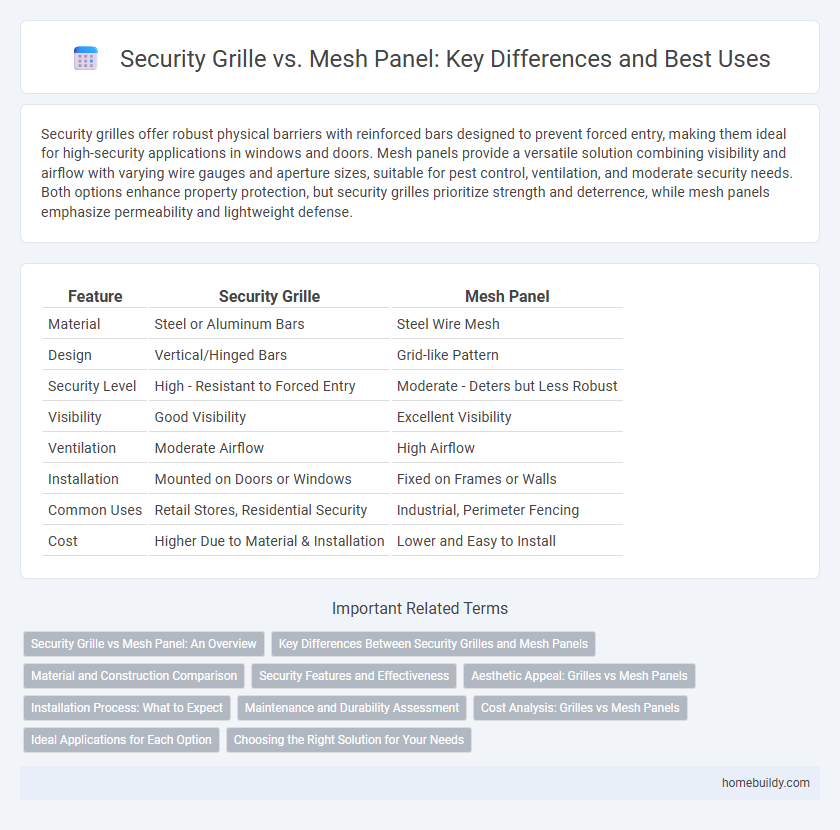Security grilles offer robust physical barriers with reinforced bars designed to prevent forced entry, making them ideal for high-security applications in windows and doors. Mesh panels provide a versatile solution combining visibility and airflow with varying wire gauges and aperture sizes, suitable for pest control, ventilation, and moderate security needs. Both options enhance property protection, but security grilles prioritize strength and deterrence, while mesh panels emphasize permeability and lightweight defense.
Table of Comparison
| Feature | Security Grille | Mesh Panel |
|---|---|---|
| Material | Steel or Aluminum Bars | Steel Wire Mesh |
| Design | Vertical/Hinged Bars | Grid-like Pattern |
| Security Level | High - Resistant to Forced Entry | Moderate - Deters but Less Robust |
| Visibility | Good Visibility | Excellent Visibility |
| Ventilation | Moderate Airflow | High Airflow |
| Installation | Mounted on Doors or Windows | Fixed on Frames or Walls |
| Common Uses | Retail Stores, Residential Security | Industrial, Perimeter Fencing |
| Cost | Higher Due to Material & Installation | Lower and Easy to Install |
Security Grille vs Mesh Panel: An Overview
Security grilles offer robust physical protection with adjustable bars that provide high visibility and ventilation, making them ideal for storefronts and high-security areas. Mesh panels, composed of interwoven metal wires, deliver enhanced tamper resistance and better debris prevention while maintaining airflow and visibility. Choosing between security grilles and mesh panels depends on specific security needs, ventilation requirements, and aesthetic preferences.
Key Differences Between Security Grilles and Mesh Panels
Security grilles typically feature sturdy metal bars or slats arranged in a decorative or functional pattern, providing high-impact resistance and enhanced security for storefronts or windows. In contrast, mesh panels consist of woven wire or metal strands forming a grid, offering visibility and ventilation while maintaining a moderate level of protection. Key differences include the design structure--solid bars versus interwoven wires--and their applications, where security grilles are preferred for maximum barrier strength and mesh panels suit environments requiring airflow and reduced visibility.
Material and Construction Comparison
Security grilles are typically constructed from robust steel or aluminum with angled or flat bars, providing high durability and resistance to forced entry, while mesh panels often use thinner wire strands woven into a grid pattern, offering less structural strength but greater visibility. The solid, rigid framework of security grilles enhances impact resistance and makes them suitable for high-security applications, whereas mesh panels prioritize ventilation and light passage but may require additional reinforcement for comparable security. Material thickness, bar spacing, and weld quality are critical factors influencing the overall effectiveness and longevity of both security grilles and mesh panels.
Security Features and Effectiveness
Security grilles provide a robust physical barrier, often constructed from heavy-duty steel or aluminum, enhancing resistance against forced entry compared to mesh panels. Their closely spaced bars and reinforced locking mechanisms offer superior protection against tampering and intrusion attempts, making them more effective in high-security environments. Mesh panels, while allowing better visibility and airflow, generally lack the same level of structural integrity and are more susceptible to cutting or breaching tools.
Aesthetic Appeal: Grilles vs Mesh Panels
Security grilles offer a sleek and structured appearance, often enhancing architectural aesthetics with customizable patterns and finishes that blend seamlessly with modern design. Mesh panels, while offering high visibility and ventilation, tend to appear more industrial and utilitarian, lacking the refined visual appeal of security grilles. Choosing security grilles elevates the aesthetic value of a space by providing both protection and a polished, decorative element.
Installation Process: What to Expect
Security grilles typically require professional installation due to their heavier frames and need for precise mounting, ensuring maximum durability and security for doors or windows. Mesh panels, being lighter and more flexible, offer a quicker and simpler installation process, often suitable for DIY projects or temporary setups. Expect security grilles to involve drilling into walls or frames, while mesh panels can usually be fixed with screws or clips, impacting the time and tools needed.
Maintenance and Durability Assessment
Security grilles offer lower maintenance requirements compared to mesh panels due to their robust construction and fewer components prone to wear and tear. Durability assessments highlight security grilles' enhanced resistance to corrosion and physical impact, making them ideal for long-term use in high-security areas. Mesh panels may require more frequent inspections and repairs, especially in harsh environmental conditions, reducing their overall lifespan.
Cost Analysis: Grilles vs Mesh Panels
Security grilles generally offer a more cost-effective solution compared to mesh panels due to their simpler design and lower material requirements, which reduce manufacturing and installation expenses. Mesh panels, while often providing enhanced visibility and airflow, tend to involve higher costs linked to their intricate construction and stronger materials for durability. Choosing between them depends on budget constraints and specific security needs, with grilles often preferred for budget-sensitive projects.
Ideal Applications for Each Option
Security grilles are ideal for retail storefronts and commercial entrances where maximum visibility and ventilation are needed, offering strong physical barriers against theft and vandalism. Mesh panels suit industrial environments and warehouses requiring high-impact resistance and durable protection while allowing airflow and light penetration. Choosing between them depends on specific security needs, aesthetic preferences, and ventilation requirements in the protected area.
Choosing the Right Solution for Your Needs
Security grilles provide robust physical barriers with enhanced visibility and airflow, ideal for retail storefronts and high-traffic areas requiring quick access control. Mesh panels offer lighter protection, better suited for indoor applications where ventilation and visibility are prioritized over heavy-duty security. Evaluating factors like installation environment, security level, and aesthetic preferences will help determine whether a security grille or mesh panel best meets your specific protection requirements.
Security grille vs Mesh panel Infographic

 homebuildy.com
homebuildy.com